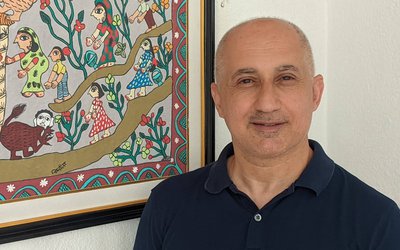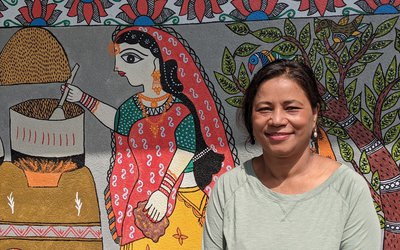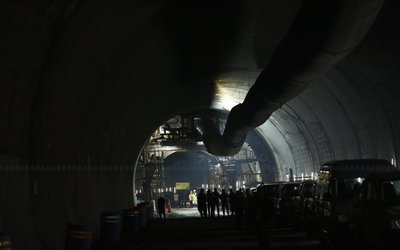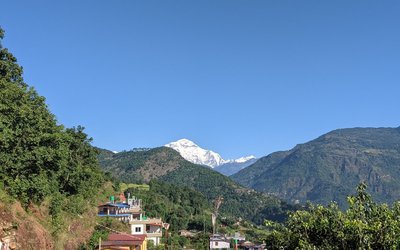
Krishna Man Pradhan, Executive Director of Nepal Law Society, has been engaged in the constitutional development and promotion of rule of law since last 25 years. As the country is struggling with the constitution making process, Pradhan is actively leading the programs to run the Constitutional Information Centers (CICs) in all 14 zones of the country, through which people are informed about the updates of the process and are provided with the documents of the Constituent Assembly (CA). The centers have acted as two-way bridge between CA and the general people. In this context, NEW SPOTLIGHT spoke to Pradhan on the ongoing political instability and the reasons behind it. Excerpts:
Despite efforts from all quarters, the political instability seems to continue in the country. Why?
The results of the first and second Constituent Assembly (CA) threw two different kinds of results. The first CA had put the UCPN-Maoists in the first place whereas the second CA put the party in the third place. This has resulted in unease among the political forces and they are still unable to grasp the reality. Besides, the issue of nature of state restructuring has become a highly contentious issue. Parties have cornered themselves by embracing tough positions. No one wants to climb down from their position. There has been no constructive negotiation or give-and-take to settle this issue.
Do the parties gain by dragging out the constitutional making process?
I don't think so. The constitution through the elected CA has been a long held desire of the people of Nepal. That apart, there is also the desire to have a truly inclusive constitution that accommodates all caste, community, gender, religion and region. Most of the parties have also expressed their commitment to write democratic and inclusive constitution through the CA. However, there are some issues in which they have been unable to reach settlement. This has resulted in the prolonging of the process.
Do you think the second CA will be able to deliver constitution?
I firmly believe that the political parties of Nepal are a responsible lot. Though there is a bitter debate between the ruling parties and the opposition regarding whether the constitution making should proceed on the basis of set procedures, both the sides are equally aware about the importance of having a constitution that is widely accepted and owned. Since they agree on the basic norm, they will, sooner or later, realize the futility of this bitter dispute. And when that happens, the second CA will be able to come up with the new democratic and inclusive constitution.
Your organization NLS is operating Constitution Information Centers (CICs) in 14 zones. People throng to these centers for the information about constitution making. How is the perception of people toward the second CA and the continued delay in promulgation of new constitution?
Let me first tell you why the CICs were formed in the first place. It was during the term of the first CA when the CA members and officials all felt there was a need for them to go directly to the general public with the authentic and updated information so that the growing tide of public anxiety over the delay in the constitution making could be addressed. Since the government and the CA alone do not have the time or the resources for the purpose, they sought the help from civil society organizations. In the first phase, the NLS worked in partnership with International IDEA, USAID and UNDP to operate the CICs in all 14 zones. Later on, RDIF and ESP joined this partnership. At present, the CICs are being run with the support from International IDEA, Swiss Embassy in Nepal and UNDP. These 14 CICs not only provide CA-related information but also run public libraries from where the people can learn about the issues like constitution, democracy, rule of law, inclusion etc. These CICs also regularly hold interactions and sharing programs on constitutional issues like state restructuring, form of governance, judiciary and election system. They are held in non-biased manner by inviting experts as resource persons. Participants include representatives from all the parties in the respective districts apart from local community leaders, teachers, officials and members of disadvantaged groups like women, Dalit, Madhesis, Muslims, Janajatis etc. In the last five years, the CICs have invited over 500 CA members to participate in their programs and share their views. More than 2000 programs have been held in which over 200,000 people have taken part. Additional 100,000 people have visited our libraries. We have also run media programs such as radio and TV debates on key issues. Those programs have benefited around one million people. Coming back to your question, yes there is a certain degree of apprehension and even anger among the people at the delay in constitution making. However, people are still hopeful of early constitution. In the programs the CICs hold, people freely take part and interact. The resource persons and CA members are able to clarify misconceptions and address their anxiety to a certain degree. People are still committed to the CA and wish to see constitution written through the CA they have elected.
How do they look at the issues of state restructuring and forms of governance?
People want to see a widely accepted constitution that addresses their concerns of rights and development both. I think the political parties have unnecessarily spoiled the atmosphere by being unable to properly educate the people about what they want through the federalism.
There is also a lot of concern about the lack of local elections. What do you think?
That is a crucial matter. It has been 16 years since the last local elections were held. After the term of the elected representatives expires, the DDCs, VDCs and municipalities were run either by bureaucrats or through all party mechanisms. None of them worked satisfactory. People are yearning for the early local election. The local election, they believe, will trigger local development and promote good governance.
How will the local elections promote accountability and good governance?
At present, each VDC can spend between 1.5 million to 4 million rupees every year. The Local Self Governance Act 1999 had envisaged 53 elected officials for each VDC. However, currently they are being run by one VDC secretary only. Local people are currently unable to participate in the planning and implementation of development efforts. The gap between the public and the local bodies has grown. The number of cases of corruption filed at the Commission for Investigation of Abuse of Authority also shows that there has been huge increase in corruption in local bodies in this period. Therefore, the local elections must be held at the earliest from which elected representatives accountable to the people will be able to run the local bodies.
- TANAHU HYDROPOWER PROEJCT: A Significant Achievement
- Apr 15, 2024
- AMBASSADOR HANAN GODAR: Sharing Pain With A Nepali Family
- Mar 30, 2024
- VISIT OF KfW AND EIB TO NEPAL : Mission Matters
- Mar 25, 2024
- NEPAL BRITAIN SOCIETY: Pratima Pande's Leadership
- Mar 24, 2024
- NEPAL ARMY DAY: Time To Recall Glory
- Mar 15, 2024















